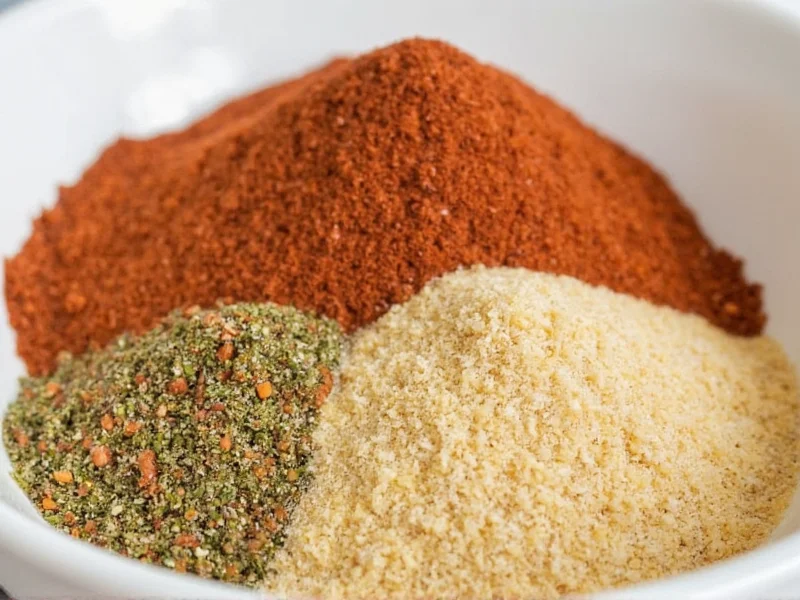When you're in the middle of preparing your favorite roast chicken or holiday stuffing and realize you're out of poultry seasoning, knowing reliable substitutes can save your meal. This comprehensive guide provides tested alternatives that maintain the savory, aromatic qualities essential for perfect poultry dishes.
Understanding Poultry Seasoning Composition
Standard poultry seasoning typically contains a blend of dried herbs and spices designed to complement chicken, turkey, and other birds. Most commercial blends include:
- Sage (the dominant flavor)
- Thyme
- Rosemary
- Marjoram or oregano
- Black pepper
- Nutmeg or allspice
- Sometimes celery seed or red pepper flakes
The precise ratio varies by brand, but sage usually comprises about 30-40% of the blend. This knowledge helps create accurate poultry seasoning replacements that deliver consistent results in your cooking.
Best All-Purpose Poultry Seasoning Substitute
For most recipes calling for 1 tablespoon of poultry seasoning, use this versatile replacement:
| Herb/Spice | Measurement | Flavor Contribution |
|---|---|---|
| Dried sage | 1 tsp | Earthy, slightly peppery base note |
| Dried thyme | 1 tsp | Floral, lemony complexity |
| Dried rosemary | 1/2 tsp | Pine-like aroma, robust character |
| Dried marjoram | 1/4 tsp | Sweet, citrus undertones |
| Black pepper | 1/4 tsp | Subtle heat and depth |
| Ground nutmeg | Pinch (1/8 tsp) | Warm, sweet finish |
This homemade poultry seasoning substitute works perfectly for roasting whole birds, seasoning stuffing, or enhancing gravy. For fresh herb alternatives when cooking poultry, multiply dried measurements by three (1 tsp dried = 1 tbsp fresh).
Dietary-Specific Poultry Seasoning Replacements
Different dietary needs require tailored approaches to poultry seasoning replacement:
Low-Sodium Poultry Seasoning Alternative
When reducing sodium intake while maintaining flavor:
- Use the standard blend above without adding salt
- Add 1/4 teaspoon onion powder for umami depth
- Include a pinch of celery seed for complexity
- Boost with 1/2 teaspoon nutritional yeast for savory notes
Gluten-Free Poultry Seasoning Substitute
Most poultry seasoning is naturally gluten-free, but commercial blends sometimes contain anti-caking agents. For guaranteed gluten-free poultry seasoning replacement:
- Use only pure dried herbs (check labels for additives)
- Avoid pre-mixed blends that might contain wheat derivatives
- Make your own using the basic recipe above
Single-Herb Poultry Seasoning Alternatives
When you only have limited pantry options, these individual herb substitutions work in a pinch:
- Sage-only replacement: Use 2 teaspoons dried sage per tablespoon of poultry seasoning (best for traditional Thanksgiving stuffing)
- Thyme-focused substitute: 1 1/2 teaspoons dried thyme + 1/2 teaspoon black pepper (ideal for chicken roasts)
- Herbes de Provence blend: Substitute equal parts for poultry seasoning (works well for Mediterranean-style poultry dishes)
- Italian seasoning alternative: Use 1:1 ratio but reduce by 25% (contains more oregano and basil which alter flavor profile)
Measurement Conversion Guide for Poultry Seasoning Substitutes
Scale your homemade poultry seasoning replacement accurately with this conversion chart:
| Recipe Calls For | Dry Measure | Homemade Replacement |
|---|---|---|
| 1 teaspoon poultry seasoning | 5 ml | 1/3 tsp sage + 1/3 tsp thyme + other spices |
| 1 tablespoon poultry seasoning | 15 ml | 1 tsp sage + 1 tsp thyme + 1/2 tsp rosemary + etc. |
| 1/4 cup poultry seasoning | 60 ml | 4 tsp sage + 4 tsp thyme + 2 tsp rosemary + etc. |
| 1 cup poultry seasoning | 240 ml | 16 tsp sage + 16 tsp thyme + 8 tsp rosemary + etc. |
Common Poultry Seasoning Replacement Mistakes
Avoid these frequent errors when substituting poultry seasoning:
- Overusing single herbs - Sage dominates when used alone; balance is crucial for authentic poultry seasoning replacement
- Ignoring freshness - Dried herbs lose potency after 6-12 months; test aroma before using for accurate poultry seasoning substitute
- Adding salt unnecessarily - Most recipes already contain salt; add separately if needed after tasting
- Using fresh herbs in equal amounts - Fresh herbs require triple the quantity of dried for equivalent flavor in poultry seasoning replacement
Storage Tips for Homemade Poultry Seasoning Blends
Create a batch of your custom poultry seasoning replacement and store it properly:
- Use airtight glass containers away from heat and light
- Label with creation date (best used within 6 months)
- Store in cool, dark pantry (not above the stove)
- Refresh potency by toasting whole spices before grinding
- Consider making smaller batches for most frequently used poultry seasoning alternatives
When to Adjust Your Poultry Seasoning Replacement
Tailor your homemade blend based on cooking application:
- For roasting whole birds: Increase rosemary by 25% for better crust development
- For soups and stews: Add 1/4 teaspoon celery seed to your poultry seasoning substitute
- For stuffing and dressing: Include a pinch of allspice instead of nutmeg
- For grilled poultry: Boost black pepper by 50% in your poultry seasoning replacement
- For delicate dishes: Reduce overall quantity by 25% when using homemade poultry seasoning substitute











 浙公网安备
33010002000092号
浙公网安备
33010002000092号 浙B2-20120091-4
浙B2-20120091-4